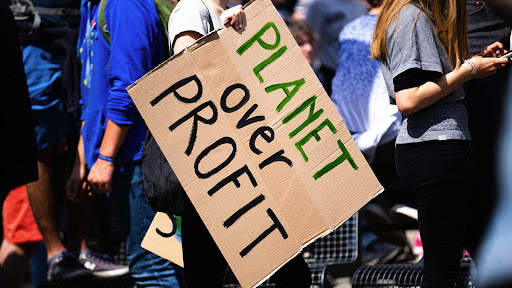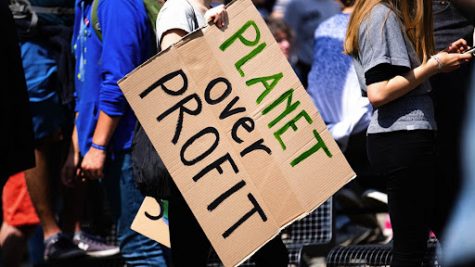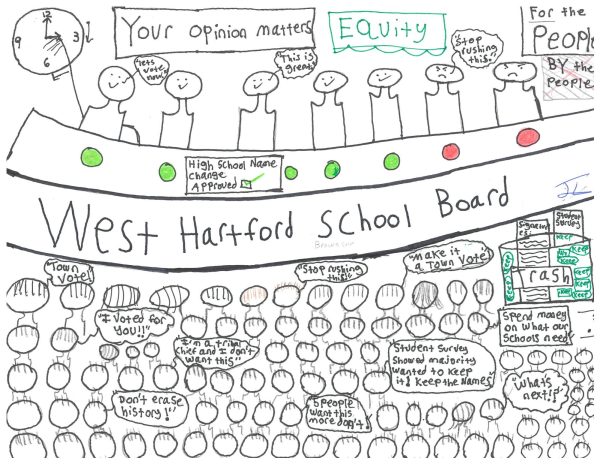Capitalism and Corruption Continue to Propagate Climate Change

Corporations are responsible for 71% of global emissions.

The idea of personal climate responsibility entails that you and your family, who are the consumers of products, are most responsible for greenhouse gas emissions and the destruction of the environment, making it your responsibility to reduce your carbon footprint.
However, widespread subscription to this notion is dangerous because it takes a narrow view concerning structural problems that are the root cause of climate change.
It should be no surprise that corporations, responsible for 71 percent of global emissions, are accountable for making this a prominent belief in society. Because corporations rely on the emitting of fossil fuels into the environment to create their products, it is natural for them to shift the blame to the consumers to continue their practices. Their business model takes root inside of an economic system that prioritizes profit over all else.
A shift to cleaner and renewable energy is either too radical or costly for them. Multinational corporations, especially oil companies such as Exxon and Shell exercise an immense influence on all branches of government by lobbying against meaningful climate action, in addition to acting as donors to the most powerful people in the country. By stalling against climate action, representatives get more corporate donations, creating an endless cycle of greed.
A stark example of corporate corruption is the case of Steven Donziger, the human rights lawyer who secured a $9.5 billion judgment against the oil company Chevron over their pollution of the Ecuadorian part of the Amazon River. However, Chevron retaliated and sued him for contempt of court. Donziger was found guilty and jailed in October 2021.
The case was notable for its corruption as the overseeing judge, Loretta Preska, had a seat in a New York chapter of the Federalist Society, a judicial lobby to which Chevron is a donor, and was handpicked for the case by Chevron invested Judge Lewis A. Kaplan.
In addition to controlling the government, corporations also control successful media. Many times, they are the media itself. Because of this, they must report on climate change in a way that is favorable to the interests of the elite, in ways such as limiting the number of stories they run on climate change, taking a moderate approach to cover them (even applauding corporations for their efforts at points), and using things like economic competitiveness as societal control to persuade people why the emitting of fossil fuels is necessary, among other things.
If they do not conform to these standards, they lose advertising and revenue. A direct result of this is a decline in readership. This is why objective scientific facts and radical activism continue to lack coverage in all forms of news media.
These are examples of the propaganda model developed by Noam Chomsky and Edward Herman in the 1988 book “Manufacturing Consent”. Because corporations and the ruling elite own all of the resources in society, they can carry out mass propaganda campaigns through the application of filters in the media which cater to the wealthy. The media gains the masses’ consent because of their status as reliable sources of information.
These problems were prominent during COP 26 (the 2021 United Nations Climate Change Conference). For Earth to avoid complete catastrophe, warming must be limited to 1.5 celsius compared to pre-industrial times. However, the pledges at the conference put the world on track for 2.4 degrees Celsius of warming, less than a quarter of what is required.
Scientists are pessimistic about our hopes. According to a survey in Nature, only 4 percent of the Intergovernmental Panel on Climate Change scientists believe limiting temperature to 1.5 percent is possible. According to a Jacobin article, “[W]ealthy nations who bear the most responsibility for the climate crisis, repeatedly resisted calls from developing countries to create a facility providing financial support for loss and damage.”
And even though all of these failures have posed an existential threat to humanity, major publications like The New York Times will continue to insist that there are so-called “positives,” or “major achievements” from these conferences in which the global elite gather. Multinational corporations will continue to buy governments to serve their interests, and the poor will continue to pay every year. People will continue to be told that it is “their fault” for the continued degradation of the environment.
It may seem like there is nothing that we can do – and that may be the case. But acknowledging the structural problems at the root of the continued climate crisis is one step in climate action. Once you have done that, participating in direct action by protesting and spreading awareness online, in your homes, and with your friends, emailing your representatives and voting are all helpful ways you can help climate action.





